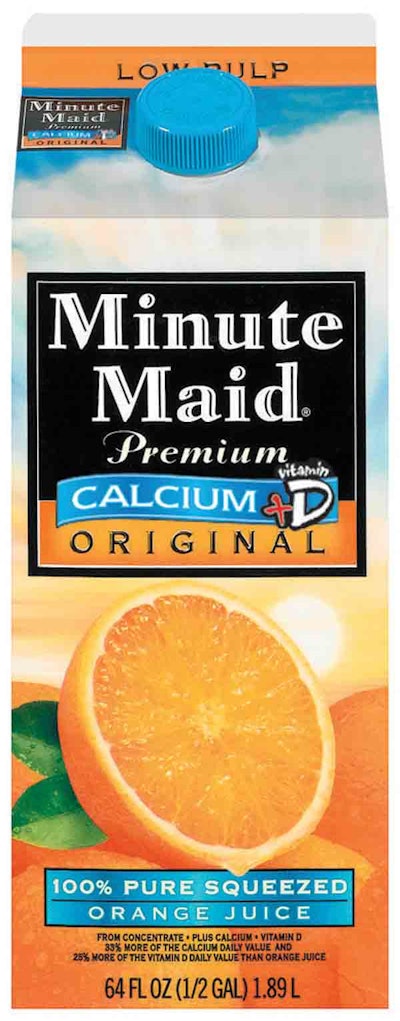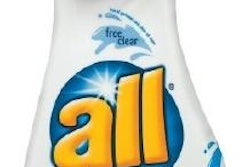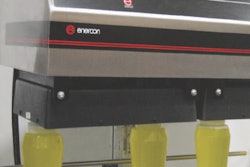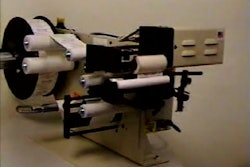
The U.S. Food and Drug Administration’s upcoming decision to make its long-standing calcium/osteoporosis health claim easier to use will set off a scramble by both milk, milk product and juice marketers to redo their product labels and packaging to take advantage of the move.
A petition from the Beverage Institute for Health and Wellness, which is funded by the Coca-Cola Co., one of whose brands is Minute Maid fruit juices and drinks, prompted the FDA to consider changes in the claim, which few products use today because of the caveats which must be included. But although a fruit juice maker got the ball rolling, the Beverage Institute, in its petition, acknowledged that producers of reduced-fat, low-fat and fat-free milk and yogurts will also benefit from a more streamlined and expanded claim.
The FDA is expected to jettison the qualifiers currently required when a product makes a calcium/osteoporosis health claim, and allow a second, new claim for the link between calcium and Vitamin D and osteoporosis, a disease that weakens bones in the body.
The National Osteoporosis Foundation says 10 million Americans already have the disease and another 34 million have low-bone density, putting them at risk for osteoporosis.
What it requires
Under the request by the Beverage Institute, a food would have to be considered “high” in both calcium and Vitamin D before it could make an osteoporosis health claim. That would mean a product would have to contain at least 20% of the Daily Value (DV) of Vitamin D and/or calcium per reference amount customarily consumed (RACC).
Once the FDA decision is finalized, milk and fruit juice marketers will begin battling one another for new market share. Cary Frye, vice president of regulatory affairs for the Intl. Dairy Foods Assn. (IDFA), says, “It is certainly clear that the intent of the petition is to be able to make stronger claims for fortified orange juice in preventing osteoporosis, to compete with milk in that regard. But the new simpler claim will be available to all foods, and it will be up to the dairy industry to leverage its nutrient-dense foods so as to market milk as the superior beverage choice.”
Tom Nagle, senior vice president of marketing for IDFA, says the milk processors education program has done recent surveys that show that consumers believe milk to be the number-one source of calcium. “Fortified juices have made progress in consumer perception, but it is our intention to protect our number-one position with consumers.”
Aggressive stance from Coke
Milk makers are apt to face a very hard assault from Coke, whose Minute Maid brand has very actively expanded its functional offerings, most recently on April 25 when it announced its Minute Maid Enhanced Juice line. It includes new Minute Maid Multi-Vitamin and Minute Maid Active™, as well as new packaging for the popular Minute Maid Heart Wise® variety.
In addition, Minute Maid already has two calcium fortified orange juice offerings: Home Squeezed Style + Calcium + Vitamin D and Minute Maid Original + Calcium. Minute Maid does not make an osteoporosis health claim for either of those two calcium-fortified drinks.
Ray Crockett, a spokesman for Coca-Cola, says the company has not decided yet whether Minute Maid would use the new calcium or calcium/Vitamin D claim when it is approved by the FDA.
Very few, if any, products carry an osteoporosis health claim on their packages today because of the qualifications that must accompany it, such as noting calcium only benefits “young adult white and Asian women who engage in regular physical activity.” Any claim also has to reference some version of “adequate calcium intake throughout life is linked to reduced risk of osteoporosis through the mechanism of optimizing peak bone mass during adolescence and early adulthood.” These qualifications have made the calcium claim unwieldy to use on labels and packages.
Minimizing qualifications
But the FDA has proposed to eliminate those qualifications and add a new calcium/Vitamin D claim. The body requires Vitamin D to absorb calcium effectively.
Minute Maid’s orange juice and some of its offshoots contain more calcium than the milk products now eligible to use the calcium/osteoporosis claim, and contain about the same level of Vitamin D.
So fruit juice companies may be able to boast about their calcium superiority in the context of a newly refined calcium/osteoporosis claim. But companies such as
General Mills owns the Yoplait and
In asking for the revisions to the calcium/osteoporosis claim, the Beverage Institute’s rationale seems to be that consumption of milk has been declining while levels of osteoporosis have remained high. The petition cites a 2002 study by the National Osteoporosis Foundation which estimated that approximately 44 million men and women in the
The unstated implication in the petition is that milk consumption alone has not made any inroads in osteoporosis, a claim that was made directly by Physicians Committee for Responsible Medicine when it challenged the “milk moustache” advertising campaign a few years back.


























